托福听力测试
tpo托福听力练习题
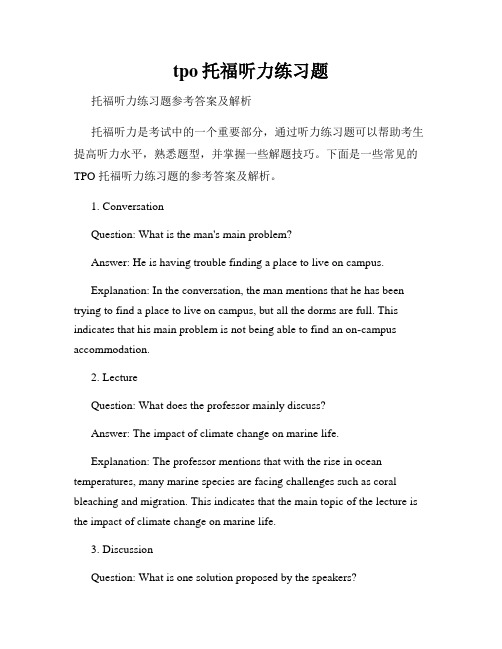
tpo托福听力练习题托福听力练习题参考答案及解析托福听力是考试中的一个重要部分,通过听力练习题可以帮助考生提高听力水平,熟悉题型,并掌握一些解题技巧。
下面是一些常见的TPO 托福听力练习题的参考答案及解析。
1. ConversationQuestion: What is the man's main problem?Answer: He is having trouble finding a place to live on campus.Explanation: In the conversation, the man mentions that he has been trying to find a place to live on campus, but all the dorms are full. This indicates that his main problem is not being able to find an on-campus accommodation.2. LectureQuestion: What does the professor mainly discuss?Answer: The impact of climate change on marine life.Explanation: The professor mentions that with the rise in ocean temperatures, many marine species are facing challenges such as coral bleaching and migration. This indicates that the main topic of the lecture is the impact of climate change on marine life.3. DiscussionQuestion: What is one solution proposed by the speakers?Answer: Building more bike lanes in the city.Explanation: In the discussion, one of the speakers suggests that building more bike lanes in the city can encourage people to commute by bike, reducing traffic congestion and air pollution. This indicates that building more bike lanes in the city is one solution proposed by the speakers.4. LectureQuestion: What is the main topic of the lecture?Answer: The evolution of language.Explanation: In the lecture, the professor discusses how language has evolved over time, from early forms of communication to the development of complex language systems. This indicates that the main topic of the lecture is the evolution of language.5. ConversationQuestion: Why does the woman want to get a refund?Answer: The product she bought was defective.Explanation: In the conversation, the woman mentions that the product she bought is not working properly and she wants to get a refund. This indicates that the reason she wants a refund is that the product she bought was defective.通过以上参考答案及解析,我们可以看到在托福听力练习题中,正确理解对话或讲座的关键信息是回答问题的关键。
2024托福考试必备听力历年真题练习
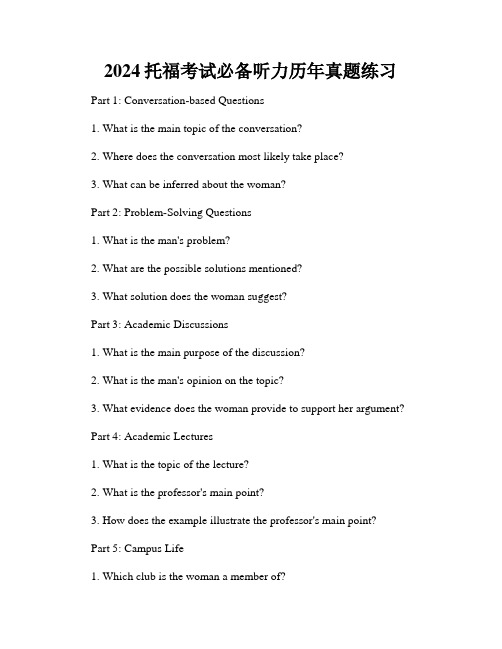
2024托福考试必备听力历年真题练习Part 1: Conversation-based Questions1. What is the main topic of the conversation?2. Where does the conversation most likely take place?3. What can be inferred about the woman?Part 2: Problem-Solving Questions1. What is the man's problem?2. What are the possible solutions mentioned?3. What solution does the woman suggest?Part 3: Academic Discussions1. What is the main purpose of the discussion?2. What is the man's opinion on the topic?3. What evidence does the woman provide to support her argument? Part 4: Academic Lectures1. What is the topic of the lecture?2. What is the professor's main point?3. How does the example illustrate the professor's main point?Part 5: Campus Life1. Which club is the woman a member of?2. Why does the woman need financial support?3. What does the man offer to do for the woman?Part 6: Academic and Social Skills1. What topic does the professor introduce?2. What is one characteristic of the topic?3. How can this characteristic be beneficial?Part 7: Science and Technology1. What is the main function of the new software?2. How does the new software differ from the old version?3. What benefit does the new software bring to users?Part 8: Advanced Level Discussions1. What is the main topic of the conversation?2. What is the man's opinion on the topic?3. How does the woman respond to the man's opinion?As the 2024 TOEFL exam is approaching, it is essential for test-takers to engage in practice sessions that familiarize them with the format and content of the listening section. One effective way to prepare is by practicing with authentic past TOEFL listening questions.In the first part of the listening section, conversation-based questions are asked. These questions assess your ability to understand the main topic of aconversation, the location where the conversation is most likely taking place, and inferencing skills about the individuals involved.The second part of the listening section focuses on problem-solving questions. These questions require you to identify the problem the speaker is facing, analyze potential solutions mentioned, and determine the best solution based on the information provided.Part three comprises academic discussions, where you are expected to identify the main purpose of the discussion, the opinions of the speakers, and supporting evidence used in the conversation.In the fourth part, academic lectures are presented, and you need to comprehend the lecture topic, understand the professor's main point, and recognize how examples or illustrations are used to support the main point.The fifth part revolves around campus life, where you must gather information about the activities, clubs, and student organizations, as well as understand the financial support and assistance offered by individuals or institutions.For the sixth part, academic and social skills are discussed. You are required to recognize the topic introduced by the professor, identify specific characteristics, and understand the potential benefits associated with these characteristics.The seventh part focuses on science and technology, exploring advancements and innovations. It requires you to understand the main functions of software or devices, identify differences between different versions, and recognize the benefits provided by newer technologies.The eighth part consists of advanced level discussions, where complex topics are debated. You are expected to identify the main topic of the conversation, grasp the speakers' opinions, and understand how the conversation unfolds based on different perspectives.By practicing with past TOEFL listening questions, you can improve your listening skills, become more familiar with various question types, and enhance your understanding of spoken English. Regular practice will help you feel more confident and prepared for the listening section of the 2024 TOEFL exam.Remember to listen carefully, take notes when necessary, and pay attention to key details and information. Developing good listening strategies and practicing with a variety of listening materials will significantly contribute to your success in the TOEFL listening section.。
小托福测试题
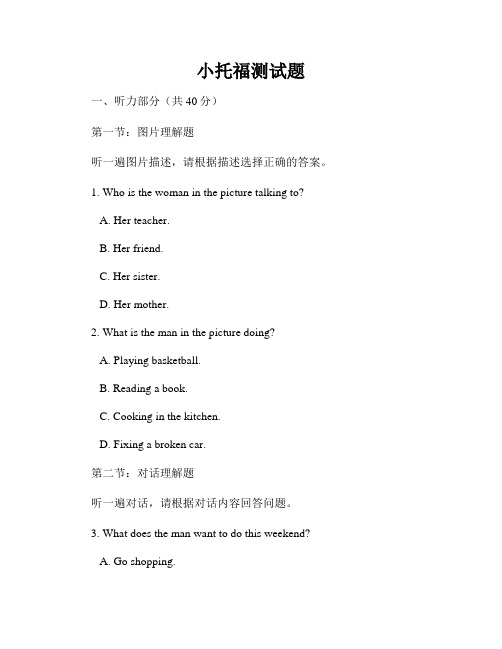
小托福测试题一、听力部分(共40分)第一节:图片理解题听一遍图片描述,请根据描述选择正确的答案。
1. Who is the woman in the picture talking to?A. Her teacher.B. Her friend.C. Her sister.D. Her mother.2. What is the man in the picture doing?A. Playing basketball.B. Reading a book.C. Cooking in the kitchen.D. Fixing a broken car.第二节:对话理解题听一遍对话,请根据对话内容回答问题。
3. What does the man want to do this weekend?A. Go shopping.B. Have a picnic.C. Visit a museum.D. Go to the beach.4. Where does the woman most likely work?A. A hotel.B. A restaurant.C. A hospital.D. A library.第三节:短文理解题听两遍短文,请根据短文内容选择正确的答案。
5. What is the main purpose of this notice?A. To inform students about class cancellation.B. To announce the schedule for the upcoming exams.C. To remind students of the school rules.D. To promote a new club on campus.6. What does the speaker suggest the students do?A. Attend the lecture next week.B. Complete the online quiz immediately.C. Submit their assignments before the deadline.D. Sign up for the after-school study group.二、阅读部分(共40分)第一节:阅读选择题阅读下列短文,然后根据短文内容选择正确的答案。
托福听力评分标准表28题
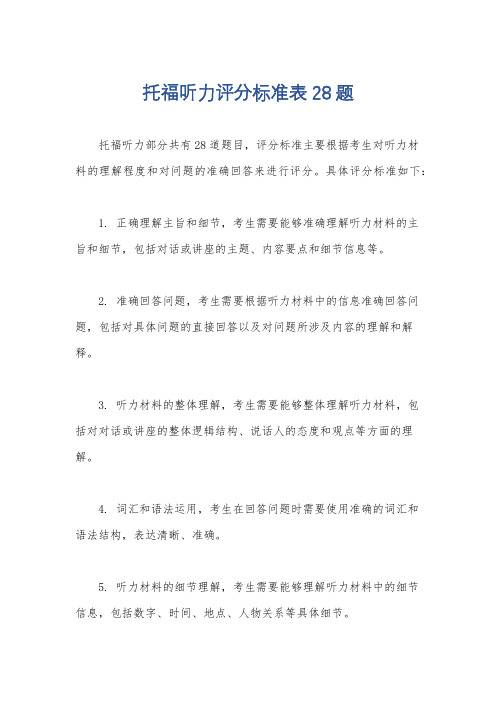
托福听力评分标准表28题
托福听力部分共有28道题目,评分标准主要根据考生对听力材
料的理解程度和对问题的准确回答来进行评分。
具体评分标准如下:
1. 正确理解主旨和细节,考生需要能够准确理解听力材料的主
旨和细节,包括对话或讲座的主题、内容要点和细节信息等。
2. 准确回答问题,考生需要根据听力材料中的信息准确回答问题,包括对具体问题的直接回答以及对问题所涉及内容的理解和解释。
3. 听力材料的整体理解,考生需要能够整体理解听力材料,包
括对对话或讲座的整体逻辑结构、说话人的态度和观点等方面的理解。
4. 词汇和语法运用,考生在回答问题时需要使用准确的词汇和
语法结构,表达清晰、准确。
5. 听力材料的细节理解,考生需要能够理解听力材料中的细节
信息,包括数字、时间、地点、人物关系等具体细节。
6. 听力材料的推理和推断,考生需要具备一定的推理和推断能力,能够根据听力材料中的信息进行合理推测和推断。
以上就是托福听力部分的评分标准,考生在备考时应该注重对以上各个方面的训练和提高,以便在考试中取得更好的成绩。
希望这些信息对你有所帮助。
托福英语阅读与听力能力测试 选择题 62题
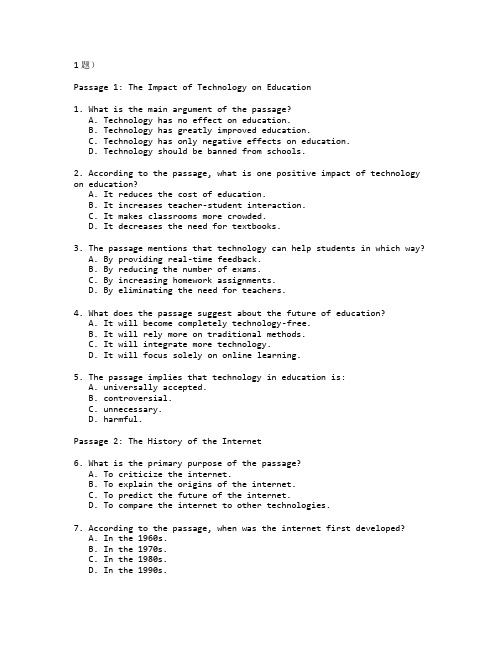
1题)Passage 1: The Impact of Technology on Education1. What is the main argument of the passage?A. Technology has no effect on education.B. Technology has greatly improved education.C. Technology has only negative effects on education.D. Technology should be banned from schools.2. According to the passage, what is one positive impact of technology on education?A. It reduces the cost of education.B. It increases teacher-student interaction.C. It makes classrooms more crowded.D. It decreases the need for textbooks.3. The passage mentions that technology can help students in which way?A. By providing real-time feedback.B. By reducing the number of exams.C. By increasing homework assignments.D. By eliminating the need for teachers.4. What does the passage suggest about the future of education?A. It will become completely technology-free.B. It will rely more on traditional methods.C. It will integrate more technology.D. It will focus solely on online learning.5. The passage implies that technology in education is:A. universally accepted.B. controversial.C. unnecessary.D. harmful.Passage 2: The History of the Internet6. What is the primary purpose of the passage?A. To criticize the internet.B. To explain the origins of the internet.C. To predict the future of the internet.D. To compare the internet to other technologies.7. According to the passage, when was the internet first developed?A. In the 1960s.B. In the 1970s.C. In the 1980s.D. In the 1990s.8. The passage mentions that the internet was initially created for:A. commercial use.B. military purposes.C. educational purposes.D. personal entertainment.9. What does the passage say about the growth of the internet?A. It has been slow and steady.B. It has been rapid and exponential.C. It has been limited to certain countries.D. It has been controlled by a single entity.10. The passage suggests that the internet has transformed which aspect of society?A. Education.B. Transportation.C. Agriculture.D. Healthcare.Passage 3: The Role of Renewable Energy11. What is the main topic of the passage?A. The disadvantages of renewable energy.B. The history of renewable energy.C. The importance of renewable energy.D. The comparison between renewable and non-renewable energy.12. According to the passage, what is one benefit of renewable energy?A. It is cheaper than non-renewable energy.B. It produces more jobs.C. It is easier to store.D. It is more reliable.13. The passage mentions that renewable energy can help address which g lobal issue?A. Overpopulation.B. Climate change.C. Economic inequality.D. Political instability.14. What does the passage suggest about the future of energy production?A. It will continue to rely on fossil fuels.B. It will shift towards renewable sources.C. It will become more centralized.D. It will decrease in overall consumption.15. The passage implies that the transition to renewable energy is:A. already complete.B. impossible.C. challenging but achievable.D. unnecessary.Passage 4: The Effects of Globalization on Culture16. What is the central theme of the passage?A. The benefits of globalization.B. The negative impacts of globalization.C. The cultural changes caused by globalization.D. The economic effects of globalization.17. According to the passage, what is one effect of globalization on cu lture?A. It increases cultural diversity.B. It homogenizes cultures.C. It preserves traditional practices.D. It isolates cultures.18. The passage mentions that globalization can lead to:A. increased cultural awareness.B. loss of cultural identity.C. greater economic stability.D. reduced social inequality.19. What does the passage suggest about the relationship between global ization and culture?A. It is always positive.B. It is always negative.C. It is complex and multifaceted.D. It is irrelevant.20. The passage implies that the impact of globalization on culture is:A. universally accepted.B. widely debated.C. insignificant.D. easily managed.Passage 5: The Importance of Biodiversity21. What is the main focus of the passage?A. The threats to biodiversity.B. The economic benefits of biodiversity.C. The ecological importance of biodiversity.D. The historical perspective on biodiversity.22. According to the passage, what is one reason biodiversity is import ant?A. It increases tourism.B. It provides genetic resources.C. It reduces pollution.D. It enhances human health.23. The passage mentions that biodiversity can contribute to:A. economic growth.B. environmental stability.C. social cohesion.D. technological innovation.24. What does the passage suggest about the current state of biodiversi ty?A. It is increasing.B. It is stable.C. It is declining.D. It is unaffected by human activities.25. The passage implies that protecting biodiversity is:A. a low priority.B. an impossible task.C. a global responsibility.D. a local issue.Passage 6: The Evolution of Transportation26. What is the main subject of the passage?A. The history of transportation.B. The future of transportation.C. The economic impact of transportation.D. The environmental effects of transportation.27. According to the passage, what is one advancement in transportation?A. The invention of the bicycle.B. The development of high-speed trains.C. The use of horses for travel.D. The reliance on walking.28. The passage mentions that transportation has influenced:A. social interactions.B. agricultural practices.C. industrial production.D. educational systems.29. What does the passage suggest about the future of transportation?A. It will become less important.B. It will focus on sustainability.C. It will revert to traditional methods.D. It will be controlled by governments.30. The passage implies that the evolution of transportation is:A. complete.B. stagnant.C. ongoing.D. irrelevant.Passage 7: The Role of Public Health Policies31. What is the main idea of the passage?A. The ineffectiveness of public health policies.B. The importance of public health policies.C. The history of public health policies.D. The comparison between public and private health policies.听力部分(共31题)Listening Section 1: Interview with a Climate Scientist32. What is the main topic of the interview?A. The history of climate science.B. The current state of climate change.C. The future predictions of climate change.D. The personal life of the climate scientist.33. According to the scientist, what is one cause of climate change?A. Increased solar activity.B. Volcanic eruptions.C. Human activities.D. Cosmic radiation.34. The scientist mentions that climate change can lead to:A. more frequent natural disasters.B. reduced agricultural productivity.C. increased economic growth.D. improved air quality.35. What does the scientist suggest we should do to address climate cha nge?A. Ignore it.B. Invest in renewable energy.C. Increase fossil fuel usage.D. Focus on space exploration.36. The scientist implies that the public's understanding of climate ch ange is:A. comprehensive.B. limited.C. incorrect.D. irrelevant.Listening Section 2: Lecture on Artificial Intelligence37. What is the main focus of the lecture?A. The history of artificial intelligence.B. The current applications of artificial intelligence.C. The future of artificial intelligence.D. The ethical concerns of artificial intelligence.38. According to the lecturer, what is one benefit of artificial intell igence?A. It reduces human error.B. It increases unemployment.C. It slows down technological progress.D. It consumes more energy.39. The lecturer mentions that artificial intelligence can be used in:A. agriculture.B. healthcare.C. finance.D. all of the above.40. What does the lecturer suggest about the future of artificial intel ligence?A. It will replace human workers.B. It will be limited to specific industries.C. It will integrate more with human activities.D. It will be banned.41. The lecturer implies that the development of artificial intelligence is:A. controlled by a few companies.B. a global effort.C. a threat to humanity.D. unnecessary.Listening Section 3: Discussion on Urban Planning42. What is the main subject of the discussion?A. The history of urban planning.B. The challenges of urban planning.C. The future of urban planning.D. The personal experiences of urban planners.43. According to the discussion, what is one challenge in urban plannin g?A. Lack of funding.B. Overpopulation.C. Environmental degradation.D. All of the above.44. The discussion mentions that urban planning can address:A. traffic congestion.B. housing shortages.C. public health issues.D. all of the above.45. What does the discussion suggest about the role of urban planners?A. They are irrelevant.B. They are decision-makers.C. They are only advisors.D. They are historians.46. The discussion implies that urban planning is:A. a simple task.B. a complex and dynamic process.C. a static process.D. a luxury.Listening Section 4: Talk on Mental Health47. What is the main topic of the talk?A. The history of mental health treatment.B. The current state of mental health.C. The future of mental health care.D. The personal experiences of mental health professionals.48. According to the speaker, what is one challenge in mental health ca re?A. Lack of awareness.B. Overmedication.C. Stigma.D. All of the above.49. The speaker mentions that mental health care can be improved by:A. increasing funding.B. promoting awareness.C. reducing regulations.D. all of the above.50. What does the speaker suggest about the future of mental health car e?A. It will decline.B. It will improve.C. It will remain unchanged.D. It will be privatized.51. The speaker implies that mental health care is:A. a low priority.B. a global issue.C. a personal issue.D. a luxury.Listening Section 5: Presentation on Space Exploration52. What is the main focus of the presentation?A. The history of space exploration.B. The current missions in space exploration.C. The future of space exploration.D. The personal experiences of astronauts.53. According to the presenter, what is one benefit of space exploratio n?A. It increases national pride.B. It advances scientific knowledge.C. It creates jobs.D. All of the above.54. The presenter mentions that space exploration can lead to:A. technological innovations.B. environmental degradation.C. economic instability.D. social isolation.55. What does the presenter suggest about the future of space explorati on?A. It will be abandoned.B. It will be limited to Earth's orbit.C. It will expand to other planets.D. It will be controlled by a single country.56. The presenter implies that space exploration is:A. a waste of resources.B. a global endeavor.C. a national competition.D. a personal achievement.Listening Section 6: Conversation on Food Security57. What is the main subject of the conversation?A. The history of food security.B. The current challenges in food security.C. The future of food security.D. The personal experiences of farmers.58. According to the conversation, what is one challenge in food securi ty?A. Climate change.B. Overpopulation.C. Economic instability.D. All of the above.59. The conversation mentions that food security can be improved by:A. increasing agricultural productivity.B. reducing food waste.C. promoting sustainable farming practices.D. all of the above.60. What does the conversation suggest about the role of governments in food security?A. They are irrelevant.B. They are the main problem.C. They have a crucial role.D. They should be abolished.61. The conversation implies that food security is:A. a local issue.B. a global issue.C. a personal issue.D. a luxury.Listening Section 7: Debate on Education Reform62. What is the main topic of the debate?A. The history of education reform.B. The current state of education reform.C. The future of education reform.D. The personal experiences of educators.答案1. B2. B3. A4. C5. B6. B7. A8. B9. B10. A11. C12. B13. B14. B15. C16. C17. B18. B19. C20. B21. C22. B23. B24. C25. C26. A27. B28. A29. B30. C31. B32. B33. C34. A35. B36. B37. B38. A39. D40. C41. B42. B43. D44. D45. B46. B47. B48. D49. B50. B51. B52. C53. D54. A55. C56. B57. B58. D59. D60. C61. B62. C。
托福听力测试题及答案
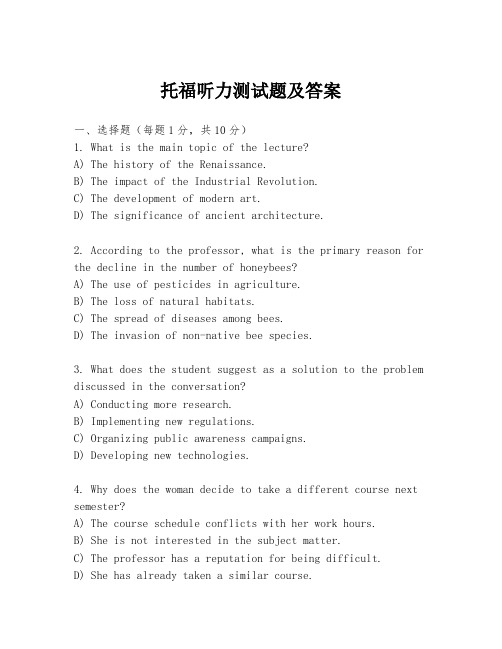
托福听力测试题及答案一、选择题(每题1分,共10分)1. What is the main topic of the lecture?A) The history of the Renaissance.B) The impact of the Industrial Revolution.C) The development of modern art.D) The significance of ancient architecture.2. According to the professor, what is the primary reason for the decline in the number of honeybees?A) The use of pesticides in agriculture.B) The loss of natural habitats.C) The spread of diseases among bees.D) The invasion of non-native bee species.3. What does the student suggest as a solution to the problem discussed in the conversation?A) Conducting more research.B) Implementing new regulations.C) Organizing public awareness campaigns.D) Developing new technologies.4. Why does the woman decide to take a different course next semester?A) The course schedule conflicts with her work hours.B) She is not interested in the subject matter.C) The professor has a reputation for being difficult.D) She has already taken a similar course.5. What is the main purpose of the campus tour mentioned in the lecture?A) To introduce new students to the campus facilities.B) To highlight the university's academic achievements.C) To promote the university to potential students.D) To raise funds for campus improvements.二、填空题(每题1分,共5分)6. The speaker mentions that the _______ is a key factor in determining the success of a business.7. In the dialogue, the man suggests that they should _______ before making a decision.8. The professor explains that the _______ theory has been widely accepted in the field of psychology.9. The woman is concerned about the _______ of the new policy on the local community.10. The student is looking for a part-time job that offers_______ and flexible hours.三、简答题(每题2分,共4分)11. Summarize the main points of the lecture on environmental conservation.12. What are the potential benefits of the proposed research project discussed in the conversation?四、论述题(每题3分,共3分)13. Discuss the role of technology in modern education andits implications for the future of learning.答案:1-5: D A C A C6. innovation7. consult with an expert8. cognitive dissonance9. impact10. health insurance11. The lecture covered the importance of biodiversity, the threats to natural habitats, and the need for sustainable practices.12. The research could lead to new treatments for diseases, improve public health, and contribute to scientific knowledge.13. Technology has revolutionized education by providing access to a wealth of information and interactive learning tools. However, it also raises concerns about the potential loss of human interaction and the digital divide.。
托福(听力)历年真题试卷汇编6(题后含答案及解析)
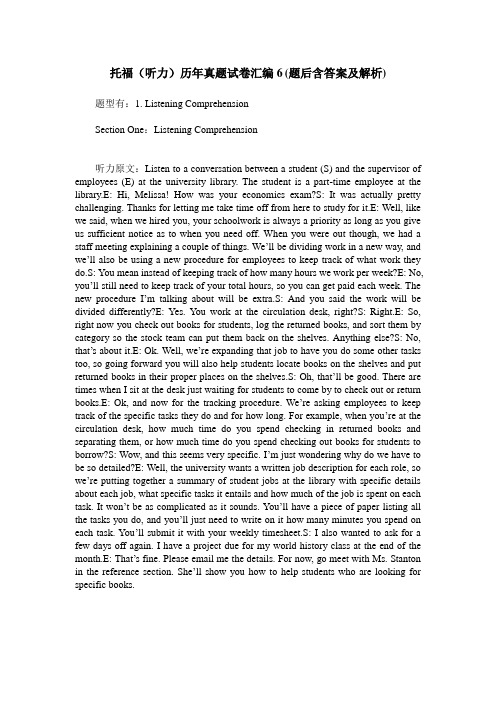
托福(听力)历年真题试卷汇编6(题后含答案及解析) 题型有:1. Listening ComprehensionSection One:Listening Comprehension听力原文:Listen to a conversation between a student (S) and the supervisor of employees (E) at the university library. The student is a part-time employee at the library.E: Hi, Melissa! How was your economics exam?S: It was actually pretty challenging. Thanks for letting me take time off from here to study for it.E: Well, like we said, when we hired you, your schoolwork is always a priority as long as you give us sufficient notice as to when you need off. When you were out though, we had a staff meeting explaining a couple of things. We’ll be dividing work in a new way, and we’ll also be using a new procedure for employees to keep track of what work they do.S: You mean instead of keeping track of how many hours we work per week?E: No, you’ll still need to keep track of your total hours, so you can get paid each week. The new procedure I’m talking about will be extra.S: And you said the work will be divided differently?E: Yes. You work at the circulation desk, right?S: Right.E: So, right now you check out books for students, log the returned books, and sort them by category so the stock team can put them back on the shelves. Anything else?S: No, that’s about it.E: Ok. Well, we’re expanding that job to have you do some other tasks too, so going forward you will also help students locate books on the shelves and put returned books in their proper places on the shelves.S: Oh, that’ll be good. There are times when I sit at the desk just waiting for students to come by to check out or return books.E: Ok, and now for the tracking procedure. We’re asking employees to keep track of the specific tasks they do and for how long. For example, when you’re at the circulation desk, how much time do you spend checking in returned books and separating them, or how much time do you spend checking out books for students to borrow?S: Wow, and this seems very specific. I’m just wondering why do we have to be so detailed?E: Well, the university wants a written job description for each role, so we’re putting together a summary of student jobs at the library with specific details about each job, what specific tasks it entails and how much of the job is spent on each task. It won’t be as complicated as it sounds. You’ll have a piece of paper listing all the tasks you do, and you’ll just need to write on it how many minutes you spend on each task. You’ll submit it with your weekly timesheet.S: I also wanted to ask for a few days off again. I have a project due for my world history class at the end of the month.E: That’s fine. Please email me the details. For now, go meet with Ms. Stanton in the reference section. She’ll show you how to help students who are looking for specific books.1.What is the conversation mainly about?A.Additional tasks the student will be expected to carry outB.The student’s interest in switching jobs at the libraryC.Procedures the student should use to request time of her workD.An evaluation of the student’s performance at her library job正确答案:A解析:内容主旨题。
托福考试2024听力历年真题答案解析

托福考试2024听力历年真题答案解析2024年的托福考试听力部分,如往年一样,包含了一系列听力材料和相关问题。
本文将对历年真题中的听力部分进行题目解析和答案解释,以帮助考生更好地备考。
[介绍段]在托福考试听力部分,考生需要听取一段语音材料,然后回答几个与材料相关的问题。
这些材料可以是学术讲座、对话、课堂讨论等。
对于每种材料,考生需要仔细倾听,并在听完后选择正确的答案。
以下是对几个典型历年真题的解析。
[题目一]Question: What is the main topic of the lecture?听力材料:一段讲座内容,讲述关于生态系统中濒临灭绝的物种。
解析:这道题目需要考生仔细倾听讲座内容,判断讲座的主要话题。
在听力材料中,讲师提到了一系列与生态系统和濒临灭绝物种相关的信息。
考生需要筛选出这些信息并进行归纳,最终选择与之相关的答案。
答案解释:主要讲座话题是关于生态系统中濒临灭绝的物种。
在听力材料中,讲师提到了研究人员进行调查、濒临灭绝物种对生态系统的重要性等相关内容。
因此,正确答案应选择与这个主题相关的选项。
[题目二]Question: What is the relationship between the two speakers?听力材料:一段对话,讨论两位发言者的关系。
解析:这道题目需要考生仔细研究对话内容,判断两位发言者之间的关系。
在对话中,两位发言者可能会透露出彼此之间的身份、职位或熟悉程度等信息。
考生需要根据对话内容进行分析,并选择最符合描述的答案。
答案解释:根据对话中的内容,我们可以推断出两位发言者是一位教授和一位学生。
在对话中,教授提到了自己的研究、学生的作业等相关内容,这表明教授与学生之间存在一种教育关系。
[题目三]Question: What is the purpose of the conversation?听力材料:一段对话,讨论对话的目的。
解析:这道题目需要考生理解对话中的目的或主要内容。
托福听力测试题及答案

托福听力测试题及答案
1. 听下面对话,回答以下问题:
对话中提到的会议是在什么时候举行的?
A. 上午9点
B. 下午3点
C. 晚上7点
D. 没有提及具体时间
答案:B
2. 听下面讲座,回答以下问题:
教授在讲座中提到了哪种动物的迁徙行为?
A. 蝴蝶
B. 鲸鱼
C. 企鹅
D. 鸟类
答案:A
3. 听下面对话,回答以下问题:
学生为什么去找教授?
A. 询问作业
B. 寻求建议
C. 讨论成绩
D. 报告问题
答案:B
4. 听下面讲座,回答以下问题:
讲座中提到的艺术家是哪个国家的?
A. 法国
B. 意大利
C. 西班牙
D. 荷兰
答案:D
5. 听下面对话,回答以下问题:
对话中提到的图书馆在哪里?
A. 校园中心
B. 校园东边
C. 校园西边
D. 校园北边
答案:C
6. 听下面讲座,回答以下问题:
讲座中提到的实验结果是什么?
A. 成功
B. 失败
C. 需要进一步研究
D. 无法确定
答案:C
7. 听下面对话,回答以下问题:
对话中提到的天气如何?
A. 晴朗
B. 多云
C. 下雨
D. 雪
答案:C
8. 听下面讲座,回答以下问题:
讲座中提到的新技术对环境有何影响?
A. 正面影响
B. 负面影响
C. 没有影响
D. 影响未知
答案:A
结束语:以上是本次托福听力测试题及答案,希望能够帮助考生更好地准备考试。
托福考试模拟试题及答案word
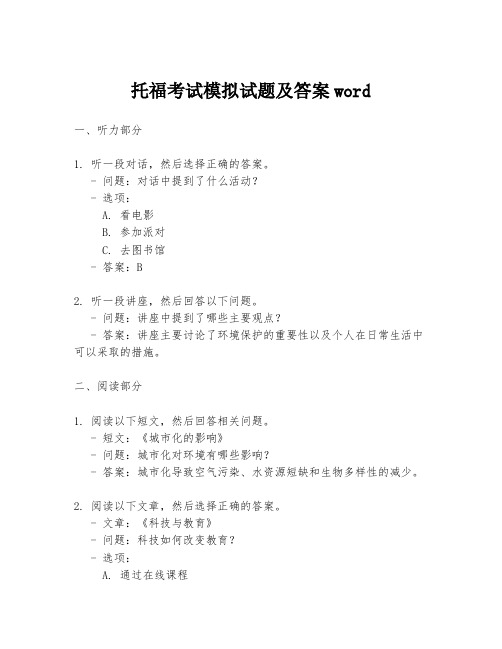
托福考试模拟试题及答案word一、听力部分1. 听一段对话,然后选择正确的答案。
- 问题:对话中提到了什么活动?- 选项:A. 看电影B. 参加派对C. 去图书馆- 答案:B2. 听一段讲座,然后回答以下问题。
- 问题:讲座中提到了哪些主要观点?- 答案:讲座主要讨论了环境保护的重要性以及个人在日常生活中可以采取的措施。
二、阅读部分1. 阅读以下短文,然后回答相关问题。
- 短文:《城市化的影响》- 问题:城市化对环境有哪些影响?- 答案:城市化导致空气污染、水资源短缺和生物多样性的减少。
2. 阅读以下文章,然后选择正确的答案。
- 文章:《科技与教育》- 问题:科技如何改变教育?- 选项:A. 通过在线课程B. 通过提高学费C. 通过减少教师数量- 答案:A三、口语部分1. 描述你最近参加的一个活动,并解释为什么你选择参加它。
- 答案示例:我最近参加了一个环保志愿者活动,因为我对环境保护非常感兴趣,并且希望能够为保护我们的地球做出贡献。
2. 讨论你如何看待全球化对文化的影响。
- 答案示例:我认为全球化促进了不同文化之间的交流和理解,但同时也可能导致某些文化特色的丧失。
四、写作部分1. 写一篇短文,讨论科技发展对日常生活的影响。
- 答案示例:科技发展极大地方便了我们的日常生活,例如智能手机让我们随时随地都能获取信息,但同时也带来了隐私和安全问题。
2. 选择一个你感兴趣的话题,写一篇文章表达你的观点。
- 答案示例:我选择讨论教育的重要性。
教育不仅能够提高个人的生活质量,也是社会进步和发展的关键。
结束语托福考试是一个全面评估英语能力的测试,希望以上的模拟试题及答案能够帮助你更好地准备考试。
记住,持续的练习和复习是提高语言能力的关键。
祝你考试顺利!请注意,以上内容仅为模拟试题,实际的托福考试内容和形式可能会有所不同。
考生应以官方发布的考试指南为准。
托福听力部分历年真题详解2024版
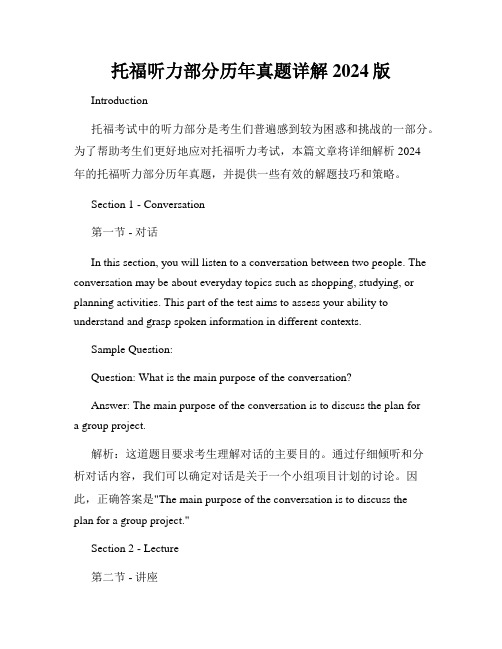
托福听力部分历年真题详解2024版Introduction托福考试中的听力部分是考生们普遍感到较为困惑和挑战的一部分。
为了帮助考生们更好地应对托福听力考试,本篇文章将详细解析2024年的托福听力部分历年真题,并提供一些有效的解题技巧和策略。
Section 1 - Conversation第一节 - 对话In this section, you will listen to a conversation between two people. The conversation may be about everyday topics such as shopping, studying, or planning activities. This part of the test aims to assess your ability to understand and grasp spoken information in different contexts.Sample Question:Question: What is the main purpose of the conversation?Answer: The main purpose of the conversation is to discuss the plan fora group project.解析:这道题目要求考生理解对话的主要目的。
通过仔细倾听和分析对话内容,我们可以确定对话是关于一个小组项目计划的讨论。
因此,正确答案是"The main purpose of the conversation is to discuss theplan for a group project."Section 2 - Lecture第二节 - 讲座In this section, you will listen to a lecture or a speech by a professor. The lecture will cover academic topics and the speaker will often provide examples and explanations to support their main points. This part of the test assesses your ability to comprehend and extract information from lectures.Sample Question:Question: What is the professor's opinion about the new research findings?Answer: The professor's opinion is that the new research findings are promising, but further studies are needed to confirm the results.解析:这道题目要求考生理解教授对新的研究发现的观点。
托福(听力)历年真题试卷汇编2(题后含答案及解析)
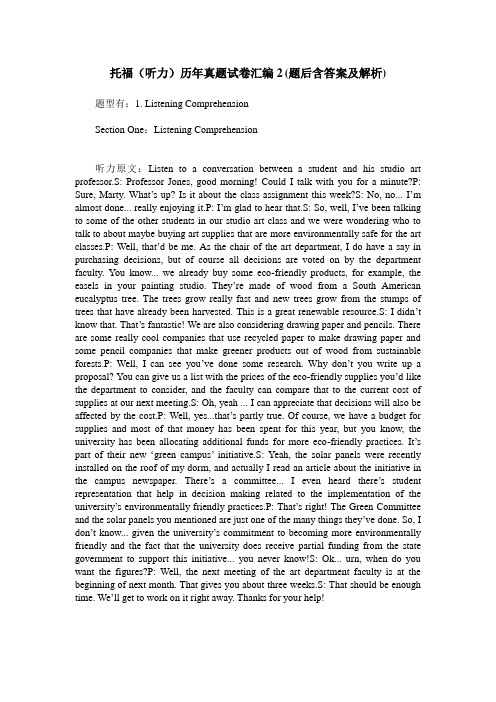
托福(听力)历年真题试卷汇编2(题后含答案及解析) 题型有:1. Listening ComprehensionSection One:Listening Comprehension听力原文:Listen to a conversation between a student and his studio art professor.S: Professor Jones, good morning! Could I talk with you for a minute?P: Sure, Marty. What’s up? Is it about the class assignment this week?S: No, no... I’m almost done... really enjoying it.P: I’m glad to hear that.S: So, well, I’ve been talking to some of the other students in our studio art class and we were wondering who to talk to about maybe buying art supplies that are more environmentally safe for the art classes.P: Well, that’d be me. As the chair of the art department, I do have a say in purchasing decisions, but of course all decisions are voted on by the department faculty. You know... we already buy some eco-friendly products, for example, the easels in your painting studio. They’re made of wood from a South American eucalyptus tree. The trees grow really fast and new trees grow from the stumps of trees that have already been harvested. This is a great renewable resource.S: I didn’t know that. That’s fantastic! We are also considering drawing paper and pencils. There are some really cool companies that use recycled paper to make drawing paper and some pencil companies that make greener products out of wood from sustainable forests.P: Well, I can see you’ve done some research. Why don’t you write up a proposal? You can give us a list with the prices of the eco-friendly supplies you’d like the department to consider, and the faculty can compare that to the current cost of supplies at our next meeting.S: Oh, yeah ... I can appreciate that decisions will also be affected by the cost.P: Well, yes...that’s partly true. Of course, we have a budget for supplies and most of that money has been spent for this year, but you know, the university has been allocating additional funds for more eco-friendly practices. It’s part of their new ‘green campus’initiative.S: Yeah, the solar panels were recently installed on the roof of my dorm, and actually I read an article about the initiative in the campus newspaper. There’s a committee... I even heard there’s student representation that help in decision making related to the implementation of the university’s environmentally friendly practices.P: That’s right! The Green Committee and the solar panels you mentioned are just one of the many things they’ve done. So, I don’t know... given the university’s commitment to becoming more environmentally friendly and the fact that the university does receive partial funding from the state government to support this initiative... you never know!S: Ok... urn, when do you want the figures?P: Well, the next meeting of the art department faculty is at the beginning of next month. That gives you about three weeks.S: That should be enough time. We’ll get to work on it right away. Thanks for your help!1.Why does the student go to see the professor?A.To ask whether students can be represented at an upcoming faculty meeting B.To propose changing the kinds of supplies the art department usesC.To discuss an art project inspired by environmental concernsD.To complain about the lack of materials available to art students正确答案:B解析:目的主旨题。
托福模拟题测试题及答案
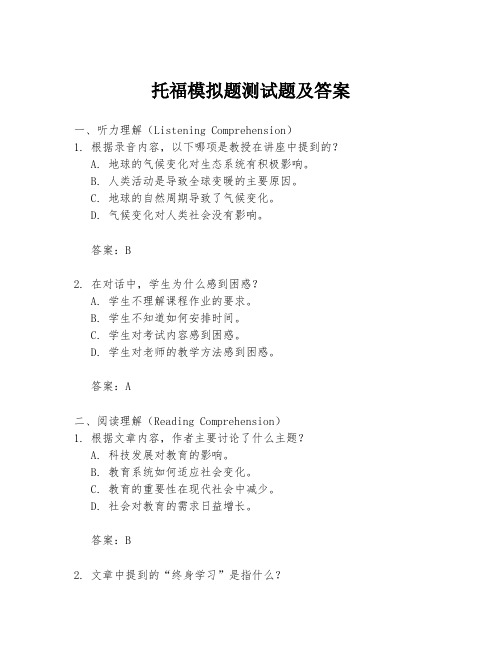
托福模拟题测试题及答案一、听力理解(Listening Comprehension)1. 根据录音内容,以下哪项是教授在讲座中提到的?A. 地球的气候变化对生态系统有积极影响。
B. 人类活动是导致全球变暖的主要原因。
C. 地球的自然周期导致了气候变化。
D. 气候变化对人类社会没有影响。
答案:B2. 在对话中,学生为什么感到困惑?A. 学生不理解课程作业的要求。
B. 学生不知道如何安排时间。
C. 学生对考试内容感到困惑。
D. 学生对老师的教学方法感到困惑。
答案:A二、阅读理解(Reading Comprehension)1. 根据文章内容,作者主要讨论了什么主题?A. 科技发展对教育的影响。
B. 教育系统如何适应社会变化。
C. 教育的重要性在现代社会中减少。
D. 社会对教育的需求日益增长。
答案:B2. 文章中提到的“终身学习”是指什么?A. 只在学生时代接受教育。
B. 教育应该贯穿一个人的整个生活。
C. 教育只对年轻人重要。
D. 教育只包括学术知识。
答案:B三、口语表达(Speaking Expression)1. 请描述你最近参加的一个活动,并解释为什么这个活动对你很重要。
(答案略)2. 你如何看待在线教育与传统教育的结合?请给出你的观点。
(答案略)四、写作能力(Writing Ability)1. 写一篇短文,讨论科技在日常生活中的作用,并给出你的观点。
(答案略)2. 选择一个你感兴趣的社会问题,写一篇文章,说明这个问题的重要性以及可能的解决方案。
(答案略)请注意:以上模拟题及答案仅供参考,实际托福考试的题型和内容可能会有所不同。
托福听力 TPO听力题目与答案1-37全套汇总(附译文)
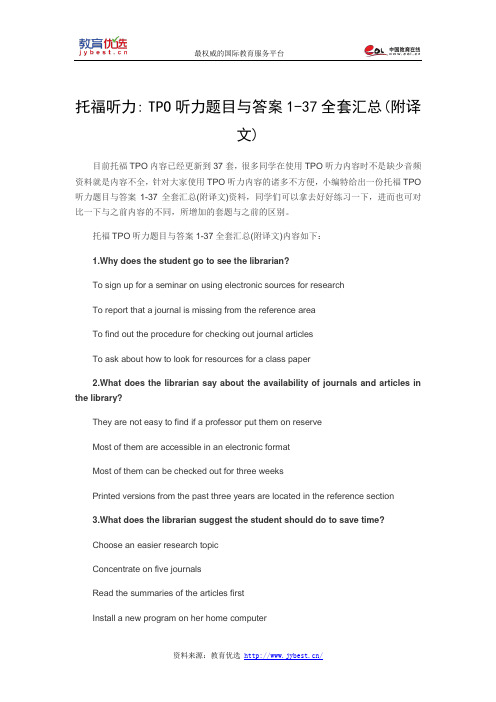
托福听力: TPO听力题目与答案1-37全套汇总(附译文)目前托福TPO内容已经更新到37套,很多同学在使用TPO听力内容时不是缺少音频资料就是内容不全,针对大家使用TPO听力内容的诸多不方便,小编特给出一份托福TPO 听力题目与答案1-37全套汇总(附译文)资料,同学们可以拿去好好练习一下,进而也可对比一下与之前内容的不同,所增加的套题与之前的区别。
托福TPO听力题目与答案1-37全套汇总(附译文)内容如下:1.Why does the student go to see the librarian?To sign up for a seminar on using electronic sources for researchTo report that a journal is missing from the reference areaTo find out the procedure for checking out journal articlesTo ask about how to look for resources for a class paper2.What does the librarian say about the availability of journals and articles in the library?They are not easy to find if a professor put them on reserveMost of them are accessible in an electronic formatMost of them can be checked out for three weeksPrinted versions from the past three years are located in the reference section3.What does the librarian suggest the student should do to save time?Choose an easier research topicConcentrate on five journalsRead the summaries of the articles firstInstall a new program on her home computer4.What can be inferred about why the woman decides to use the computer in the library?She thinks she might need additional help from the manShe does not have a computer at homeShe has to hand in her assignment by the end of the dayShe will be meeting a friend in the library later on5.Why does the woman say thisShe had forgotten about the informationShe is surprised she was not aware of the informationShe is annoyed that the information was published only recentlyShe is concerned that the librarian gave her incorrect informationStudentHi, um…, I really hope you can help me.LibrarianThat’s why I’m here. What can I do for you?StudentI’m supposed to do a literature review for my psychology course, but I’m… having a hard time finding articles. I don’t even know where to start looking.LibrarianYou said this is for your psychology course, right? So your focus is on …StudentDream Interpretation.LibrarianWell, you have a focus, so that’s already a good start. Hmmm… well, there’re a few things… oh wait… have you checked to see if your professor put any material for you to look at on reserve?StudentAha, that’s one thing I did know to do. I just copied an article, but I still need three more on my topic from three different journals.LibrarianLet’s get you going on looking for those then. We have printed versions of twenty or so psychology journals in the Reference Section. These are ones published within the last year. Now that I think about it… there’s a journal named Sleep and Dreams.StudentOh, yeah, the article I just copied is from that journal, so I’ve got to look in other sources.正确答案,D。
托福听力试题
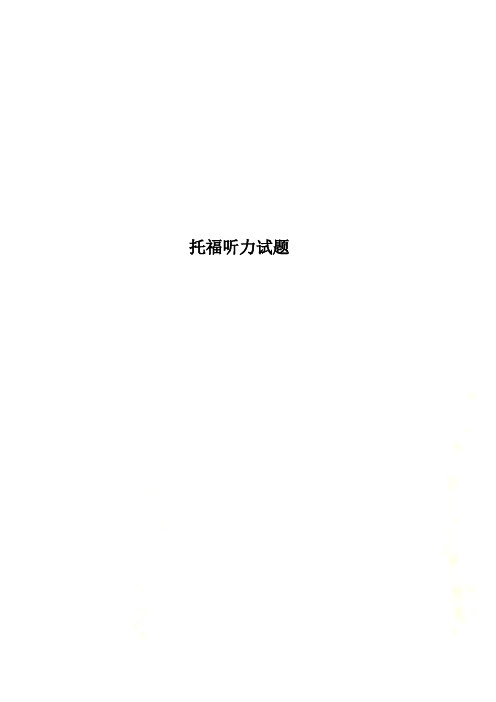
托福听力试题PRACTICE TOEFL iBT LISTENING SECTIONThis section measures your ability to understand conversations and lectures in English.You should listen to each conversation and lecture only one time.After each conversation or lecture, you will answer some questions about it. The questions typically ask about the main idea and supporting details. Some questions ask about a speaker’s purpose or attitude. Answer the questions based on what is stated or implied by the speakers.You may take notes while you listen. You may use your notes to help you answer the questions. Your notes will not be scored.In some questions, you will see this icon: PLAY-Audio This means that you will hear, but not see, part of the question.Most questions are worth 1 point. If a question is worth more than 1 point, it will have special directions that indicate how many pointsyou can receive.You will have 55 Minutes to listen to the Conversations and Lectures and to answer the questions. You should answer each question, even if you must guess the answer.Listen to Track 11 on the CD. PLAY-Audio QuestionsDirections: Mark your answer by filling in the oval next to your choice.1. Why does the student go to see the professor?○ To prepare for her graduate school interview ○ To get ad vice about her graduate school application○ To give the professor her graduate school application○ To find out if she was accepted into graduate school2. According to the professor, whatinformation should the student include inher statement of purpose?Choose 2 answers.□ Her academic motivation□ Her background in medicine□ Some personal information□ The ways her teachers have influenced her 3. What does the professor consider unusual about the student’s background?○ Her work experience○ Her creat ive writing experience○ Her athletic achievements○ Her music training4. Why does the professor tell a story about his friend who went to medical school?○ To warn the student about how difficult graduate school can be○ To illustrate a point he is makin g○ To help the student relax○ To change the subject5. What does the professor imply about the people who admit students to graduate school? ○ They often lack expertise in the fields of the applicants.○ They do not usually read the statement of purpose.○ They are influenced by the appearance of an application○ They remember most of the applications they receive.Listen to Track 12 on the CD. PLAY-Audio Questions6. What are the students mainly discussing?○ Drugs that are harmful to the human body○ B acteria that produce antibiotics○ DNA that is related to athletic performance○ Genes that protect bacteria from antibiotics 7. Listen again to part of the conversation by playing track 13Then answer the question.○ To find out if the man has done his as signment ○ To ask the man to find out if the library is open○ To let the man know that she cannot study much longer○ To ask if the man has ever met her roommate 8. According to the conversation, why are transposes sometimes called “jumping genes”?○ They are able to move from one bacteria cell to another.○ They are found in people with exceptional jumping ability.○ They occur in every other generation of bacteria.○ Their movements are rapid and unpredictable.9. According to the conversation, what are two ways in which bacteria cells get resistance genes?Choose 2 answers.□ The resistance genes are carried from nearby cells.□ The resistance genes are carried by white blood cells.□ The resistance genes are inherited from the parent cell□ The resistan ce genes are carried byantibiotics.10. What can be inferred about the resistance genes discussed in the conversation?○ They are found in all bacteria cells.○ They are not able to resist antibiotics.○ They make the treatment of bacterial diseases more difficult○ They are essential to the body’s defenses against bacteria.Listen to Track 14 on the CD. PLAY-Audio Questions11. What is the talk mainly about?○ A common method of managing water supplies○ The formation of underground water systems ○ Natu ral processes that renew water supplies ○ Maintaining the purity of underground water systems12. What is the professor’s point of view concerning the method of “safe yield”?○ It has helped to preserve the environment.○ It should be researched in states other than Arizona○ It is not an effective resource policy.○ It ignores the different ways people use water.13. According to the professor, what are twoproblems associated with removing waterfrom an underground system?Choose 2 answers.□ Pollutants c an enter the water more quickly. □ The surface area can dry and crack.□ The amount of water stored in the system can drop□ Dependent streams and springs can dry up. 14. Listen again to part of the lecture by playing track 15 PLAY-AudioThen answer the question.○ To find out whether the students are familiar with the issue○ To introduce a new problem for discussion○ To respond to a student’s question○ To encourage the students to care about the topic15. What is a key feature of a sustainable water system?○ It is able to satisfy short-term and long-term needs.○ It is not affected by changing environmental conditions○ It usually originates in lakes, springs, or streams.○ It is not used to supply human needs.16. What does the professor imply about water systems managed by the “safe yield” method?○ They recharge at a rapid rate.○ They are not sustainable.○ They must have large storage areas○ They provide a poor quality of waterListen to Track 16 on the CD. PLAY-Audio Questions17. Why does the professor talk about Plato’s description of society?○ To explain why societies face certain problems ○ To point out problems with Plato’s ethicaltheory○ To introduce students to the political structure of ancient Greece○ To help explain Plato’s view ab out the nature of the human soul18. Listen again to part of the lecture by playing track 17. PLAY-AudioThen answer the question.○ It may be familiar to some of the students.○ It will be discussed in more detail in a later class○ It is not an interesti ng theory.○ It is not a very complicated theory.19. Listen again to part of the lecture by playing track 18. PLAY-AudioThen answer the question.○ To find out if students have understood what she just said○ To suggest an answer to a question that she just asked○ To express disagreement with a point made by Plato○ To explain why harmony is difficult for a society to achieve20. What are two points that reflect Plato’s views about education?Choose 2 answers.□ All people can be trained to become leader s. □ All people should learn to use their intellect.□ Leaders should be responsible for the education of workers and soldiers□ All people should learn about the nature of the human soul.21. Based on information in the lecture, indicatewhether the statements below about humanemotion reflect beliefs held by Plato.For each sentence, put a checkmark in the YES or NO column.YES NO Emotion is usually controlled bythe faculty of desire.Emotion ought to be controlledby the faculty of intellect.Emotion is what motivatessoldiers.22. According to Plato, what is the main characteristic of a good or just person?○ The parts of the person’s soul exist in harmony.○ The person does not try to control other people.○ The person’s relationshi ps with other people are harmonious.○ The person does not act in an emotional manner.Listen to track 19 on the CD. PLAY-Audio Questions23. What is the main topic of the lecture?○ The size of root systems○ Various types of root systems○ The nutrients required by rye plants○ Improving two types of plant species24. According to the professor, why did one scientist grow a rye plant in water?○ To expose the roots to sunlight○ To be able to fertilize it with gas○ To be able to see its entire root syst em○ To see how minerals penetrate its roots25. Listen again to part of the lecture by playing track 20. PLAY-AudioThen answer the question.○ She wanted to correct the wording of a previous statement.○ She wishes she did not have to bubble gas through it.○ She realized the odor of gas could be unpleasant.○ She forgot to tell the students about a step in the experiment26. The professor mentions houseplants thatreceive too much water. Why does shemention them?○ To show that many different types of p lants can grow in water○ To explain why plants grown in water should have a gas bubbled through them○ To remind the students of the importance of their next experiment○ To make a point about the length of houseplants’ roots27. Listen again to part of the lecture by playing track 21. PLAY-AudioThen answer the question.○ Why a mistake made in textbooks was never corrected○ Why she does not believe that the roots of rye plants extend to 1,000 km○ How the roots of rye plants develop to such a great length○ How plants grown in water make use of fertilizer28. According to the professor, what similarity is there between crabgrass and rye plants?○ Both start growing in the month of May.○ Both have root systems that require a lot of water○ Both have more shoot surface than root surface.○ Both produce many shoots from a single seed.Listen to track 22 on the CD. PLAY-Audio Questions29. What is the lecture mainly about?○ Technological innovations in the automobile industry○ The organizational structure of companies○ Ways to improve efficiency in an engineering department○ Methods of resolving conflicts in organizations 30. Why does the professor talk about a construction company that has work in different cities?○ To give an example of functional org anization ○ To give an example of organization around projects○ To illustrate problems with functional organization○ To illustrate the types of conflict that can arise in companies31. Listen again to part of the lecture by playingtrack 23. PLAY-AudioThen answer the question.○ He does not understand why the student is talking about engineers.○ He wants to know how the engineers will communicate with their coworkers○ The student has not provided a complete answer to his question.○ He wants the studen t to do more research on the topic.32. What is an example of a violation of the “unity of command” principle?○ More than one person supervises the same employee.○ A company decides not to standardize its products.○ Several project managers are responsi ble for designing a new product○ An employee does not follow a supervisor’s instructions.33. According to the professor, where mightthere be a conflict in an organizationalstructure based on both projects andfunction?○ Between architects and finance experts○ Between the need to specialize and the need to standardize○ Between two engineers who work on the same project○ Between the needs of projects in different cities34. Indicate whether each sentence belowdescribes functional organization or project organization. Place a checkmark in thecorrect box.Functional Organization Project OrganizationIt encourages people with similar expertise to work closely together.It helps the company to adapt quickly and meet changing needs. It helps to achieve uniformity in projects.。
2023年9月托福考试试题

2023年9月托福考试试题一、听力部分(30分)(一)对话理解(15分)1. 有一段校园对话,男生在向女生抱怨他的室友总是在他学习的时候大声放音乐,问女生有什么建议。
这题的答案是女生建议男生先和室友好好沟通,告诉他自己的困扰。
解析就是在室友关系中,沟通是解决问题的第一步,很多时候大家可能没有意识到自己的行为给他人带来了不便,通过沟通能避免不必要的矛盾。
2. 还有一个对话是关于选课的,女生想选一门艺术课,但是担心作业太多会影响她的其他课程。
这题答案是男生告诉她可以去问上过这门课的学长学姐,这样能了解实际的作业量。
解析就是学长学姐有实际的上课经验,他们能提供比较准确的信息。
(二)讲座理解(15分)1. 有一个关于生物学的讲座,讲的是某种珍稀动物的栖息地保护。
问题是这种动物栖息地面临的主要威胁是什么。
答案是人类活动导致的栖息地破坏和气候变化。
解析就是人类的开发建设使得动物的生存空间不断缩小,气候变化也改变了它们栖息地的生态环境。
2. 另一个讲座是关于历史的,讲的是古代某个文明的贸易路线。
问题是这条贸易路线的重要意义。
答案是促进了不同地区文化和商品的交流。
解析就是贸易路线就像桥梁一样,连接了不同的地区,让各地的文化和商品能够相互传播。
二、阅读部分(30分)(一)文章阅读一(15分)这篇文章是关于科技对教育的影响的。
有个问题是科技给教育带来的最大改变是什么。
答案是让教育资源的获取更加便捷。
解析就是现在通过网络,学生可以在世界范围内获取各种学习资料,不再局限于本地的教育资源。
(二)文章阅读二(15分)文章是关于环境保护的,讲到了海洋污染的问题。
问题是海洋污染的主要污染源有哪些。
答案是工业废水排放、海上石油泄漏和生活垃圾倾倒。
解析就是工业生产产生大量含有污染物的废水排入海洋,海上石油开采和运输过程中可能发生泄漏,还有人们日常生活中的垃圾也会被倒入海洋。
三、写作部分(20分)题目是关于是否应该在大学校园里推广共享单车。
雅思托福10分钟模拟测试卷
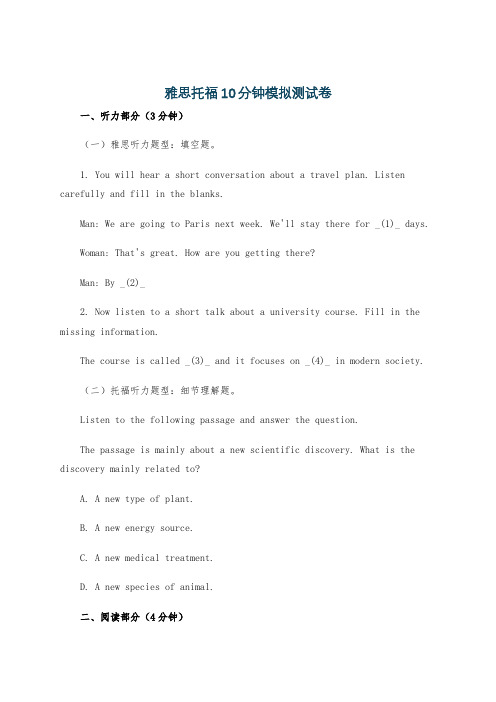
雅思托福10分钟模拟测试卷一、听力部分(3分钟)(一)雅思听力题型:填空题。
1. You will hear a short conversation about a travel plan. Listen carefully and fill in the blanks.Man: We are going to Paris next week. We'll stay there for _(1)_ days.Woman: That's great. How are you getting there?Man: By _(2)_2. Now listen to a short talk about a university course. Fill in the missing information.The course is called _(3)_ and it focuses on _(4)_ in modern society.(二)托福听力题型:细节理解题。
Listen to the following passage and answer the question.The passage is mainly about a new scientific discovery. What is the discovery mainly related to?A. A new type of plant.B. A new energy source.C. A new medical treatment.D. A new species of animal.二、阅读部分(4分钟)(一)雅思阅读题型:判断题。
Read the following passage and decide whether the statements are True, False or Not Given.Passage: The History of Coffee.Coffee has a long and interesting history. It was first discovered in Ethiopia, where it grew wild. From there, it spread to the Arabian Peninsula. By the 15th century, coffee had become a popular drink in the Middle East.1. Coffee was first found in Arabia. _(5)_2. Coffee became popular in the Middle East in the 15th century. _(6)_(二)托福阅读题型:词汇题。
托福测试题及答案

托福测试题及答案一、听力理解(Listening Comprehension)1. What is the main topic of the lecture?A. The history of photographyB. The impact of technology on artC. The role of photography in journalismD. The evolution of camera technologyAnswer: B2. According to the professor, what is one of the benefits of digital photography?A. It allows for greater artistic control.B. It is less expensive than film photography.C. It is easier to manipulate images.D. It requires less technical skill.Answer: A3. Why does the professor mention the example of the painter who used a camera?A. To illustrate the limitations of photographyB. To show how technology can inspire traditional art formsC. To demonstrate the influence of photography on paintingD. To argue that photography is a form of artAnswer: B4. What does the student imply about the relationship between photography and journalism?A. They are becoming more distinct from each other.B. They have always been closely related.C. They are merging due to technological advancements.D. They are separate fields with little overlap.Answer: C二、阅读理解(Reading Comprehension)Passage 1: The Impact of Technology on Education5. What is the author's main argument in the passage?A. Technology has had a negative impact on education.B. The integration of technology in education is essentialfor its future.C. Technology has made education less personal.D. The benefits of technology in education are overstated. Answer: B6. According to the passage, which of the following is NOT a benefit of using technology in the classroom?A. Increased student engagementB. Access to a wider range of resourcesC. Improved test scoresD. Enhanced communication between students and teachers Answer: C7. The author cites the example of online courses toillustrate:A. The accessibility of education to a broader audience.B. The potential for personalized learning experiences.C. The challenges of maintaining student motivation.D. The need for traditional classroom settings.Answer: APassage 2: The History of Urban Planning8. What is the primary focus of the passage?A. The evolution of urban planning over time.B. The role of government in urban development.C. The impact of urban planning on society.D. The challenges faced by urban planners.Answer: A9. The author mentions ancient Rome to demonstrate:A. The early origins of urban planning.B. The influence of urban planning on architecture.C. The importance of public spaces in cities.D. The limitations of early urban planning techniques. Answer: A10. What does the passage suggest about modern urban planning?A. It is more focused on aesthetics than functionality.B. It has become more inclusive and sustainable.C. It is primarily driven by economic considerations.D. It has largely abandoned traditional planning principles.Answer: B三、口语表达(Speaking Expression)Task 1: Describe a memorable event from your childhood.Sample Response:One of the most memorable events from my childhood was the summer I spent at my grandparents' farm. I was about ten years old at the time. The experience was incredibly enriching as I learned about farming, the importance of hard work, and the beauty of nature. It was a time filled with laughter, new discoveries, and a deep connection with my family.Task 2: Explain why you think environmental conservation is important.Sample Response:Environmental conservation is crucial for several reasons. Firstly, it ensures the preservation of natural resources for future generations. Secondly, it helps maintain biodiversity, which is vital for the balance of ecosystems. Lastly, conservation efforts contribute to combating climate change by reducing pollution and promoting sustainable practices. It is our collective responsibility to protect the environment for the well-being of all living beings on Earth.四、写作任务(Writing Task)Task 1: Write an essay discussing the advantages and disadvantages of social media.Sample Essay:Social media has revolutionized the way we communicate and access information. On the positive side, it allows for instant connectivity with people around the world, fosters communities with shared interests, and provides a platform for self-expression and creativity. However, it also has its downsides, such as the spread of misinformation, the potential for cyberbullying, and the negative impact on mental health due to social comparison. Balancing the benefits and drawbacks is key to harnessing the power of social media responsibly.Task 2: Propose a solution to a local environmental issue in your community.Sample Essay:One pressing environmental issue in our community is the excessive use of single-use plastics. To address this, I propose the implementation of a local ordinance that bans single-use plastic items, such as straws and bags, and encourages the use of reusable alternatives. Additionally, educational campaigns can raise awareness about the environmental impact of plastic waste. By working together, our community can significantly reduce its。
托福英语听力与口语能力测试 选择题 60题

1. What is the main topic of the conversation?A. A restaurant reviewB. A travel planC. A book discussionD. A movie recommendation2. What does the woman suggest they do next?A. Go to the libraryB. Watch a movieC. Have dinnerD. Read a book3. According to the lecture, what is the primary function of the human brain?A. To control movementB. To process informationC. To regulate body temperatureD. To produce hormones4. What is the professor's opinion about the new policy?A. It is very effectiveB. It needs more time to show resultsC. It is too expensiveD. It should be abolished5. What is the main purpose of the meeting?A. To discuss a project timelineB. To introduce new employeesC. To celebrate a milestoneD. To resolve a conflict6. What does the speaker imply about the new technology?A. It is not user-friendlyB. It has some limitationsC. It is widely adoptedD. It is very innovative7. What is the woman's major concern?A. Time managementB. Financial issuesC. Health problemsD. Academic performance8. What is the main idea of the passage?A. The history of a cityB. The impact of a natural disasterC. The development of a technologyD. The biography of a scientist9. What does the man plan to do this weekend?A. Attend a conferenceB. Visit a museumC. Go hikingD. Study at home10. What is the speaker's attitude towards the topic?A. NeutralB. PositiveC. NegativeD. Ambiguous口语部分11. Describe a time when you had to be very patient.A. Waiting in a long lineB. Completing a difficult taskC. Dealing with a slow internet connectionD. Waiting for a delayed flight12. What is your favorite way to relax?A. Reading a bookB. Watching TVC. Listening to musicD. Taking a walk13. Explain the importance of teamwork in a project.A. It increases efficiencyB. It improves communicationC. It enhances creativityD. All of the above14. What would you do if you found a lost wallet?A. Keep itB. Return it to the ownerC. Hand it over to the policeD. Post about it on social media15. Describe a memorable event in your life.A. Graduating from collegeB. Traveling abroadC. Winning a competitionD. Meeting a celebrity16. What is your opinion on the use of technology in education?A. It is essentialB. It is distractingC. It depends on the contextD. It should be minimized17. How would you handle a situation where you disagree with a friend?A. Avoid the topicB. Argue aggressivelyC. Discuss calmlyD. Ignore the friend18. What is your favorite season and why?A. Spring for new beginningsB. Summer for outdoor activitiesC. Autumn for the sceneryD. Winter for holidays19. Describe a goal you have achieved.A. Losing weightB. Learning a new skillC. Completing a degreeD. Starting a business20. What would you do if you had a day off with no responsibilities?A. Sleep all dayB. Go out with friendsC. Catch up on hobbiesD. Do nothing听力部分21. What is the main purpose of the conversation?A. To schedule a meetingB. To discuss a problemC. To plan a vacationD. To share news22. What does the man imply about the new policy?A. It is beneficialB. It is controversialC. It is temporaryD. It is mandatory23. What is the woman's main concern in the discussion?A. SafetyB. CostC. TimeD. Quality24. What is the professor's main point in the lecture?A. The importance of researchB. The challenges of teachingC. The evolution of technologyD. The impact of globalization25. What does the speaker suggest about the new project?A. It is feasibleB. It is riskyC. It is innovativeD. It is outdated26. What is the main topic of the discussion?A. Health and wellnessB. Career developmentC. Environmental issuesD. Social media trends27. What does the woman plan to do next?A. Write a reportB. Conduct an experimentC. Attend a workshopD. Review the data28. What is the speaker's opinion about the new technology?A. It is revolutionaryB. It is overhypedC. It is unreliableD. It is user-friendly29. What is the main reason for the meeting?A. To make a decisionB. To brainstorm ideasC. To resolve an issueD. To celebrate success30. What does the man imply about the new policy?A. It is strictB. It is flexibleC. It is unnecessaryD. It is beneficial口语部分31. Describe a book that had a significant impact on you.A. A novel about adventureB. A self-help bookC. A historical biographyD. A science fiction novel32. What is your favorite type of music and why?A. Classical for relaxationB. Pop for energyC. Rock for excitementD. Jazz for creativity33. Explain the importance of maintaining a healthy lifestyle.A. It improves physical healthB. It enhances mental well-beingC. It increases productivityD. All of the above34. What would you do if you saw someone being treated unfairly?A. Ignore itB. Confront the personC. Report it to authoritiesD. Offer support to the victim35. Describe a time when you had to make a difficult decision.A. Choosing a career pathB. Deciding where to liveC. Picking a college majorD. Ending a relationship36. What is your opinion on the role of government in education?A. It should be minimalB. It should be comprehensiveC. It depends on the countryD. It should be abolished37. How would you handle a situation where you made a mistake?A. Blame othersB. Apologize and correct itC. Ignore itD. Deny it38. What is your favorite holiday and why?A. Christmas for family timeB. Thanksgiving for gratitudeC. Halloween for funD. Independence Day for celebrations39. Describe a challenge you have overcome.A. Financial difficultiesB. Health issuesC. Academic challengesD. Personal conflicts40. What would you do if you won the lottery?A. Spend it allB. Invest itC. Donate itD. Save it听力部分41. What is the main purpose of the conversation?A. To plan a tripB. To discuss a projectC. To solve a problemD. To share information42. What does the man imply about the new policy?A. It is beneficialB. It is controversialC. It is temporaryD. It is mandatory43. What is the woman's main concern in the discussion?A. SafetyB. CostC. TimeD. Quality44. What is the professor's main point in the lecture?A. The importance of researchB. The challenges of teachingC. The evolution of technologyD. The impact of globalization45. What does the speaker suggest about the new project?A. It is feasibleB. It is riskyC. It is innovativeD. It is outdated46. What is the main topic of the discussion?A. Health and wellnessB. Career developmentC. Environmental issuesD. Social media trends47. What does the woman plan to do next?A. Write a reportB. Conduct an experimentC. Attend a workshopD. Review the data48. What is the speaker's opinion about the new technology?A. It is revolutionaryB. It is overhypedC. It is unreliableD. It is user-friendly49. What is the main reason for the meeting?A. To make a decisionB. To brainstorm ideasC. To resolve an issueD. To celebrate success50. What does the man imply about the new policy?A. It is strictB. It is flexibleC. It is unnecessaryD. It is beneficial口语部分51. Describe a time when you had to be very patient.A. Waiting in a long lineB. Completing a difficult taskC. Dealing with a slow internet connectionD. Waiting for a delayed flight52. What is your favorite way to relax?A. Reading a bookB. Watching TVC. Listening to musicD. Taking a walk53. Explain the importance of teamwork in a project.A. It increases efficiencyB. It improves communicationC. It enhances creativityD. All of the above54. What would you do if you found a lost wallet?A. Keep itB. Return it to the ownerC. Hand it over to the policeD. Post about it on social media55. Describe a memorable event in your life.A. Graduating from collegeB. Traveling abroadC. Winning a competitionD. Meeting a celebrity56. What is your opinion on the use of technology in education?A. It is essentialB. It is distractingC. It depends on the contextD. It should be minimized57. How would you handle a situation where you disagree with a friend?A. Avoid the topicB. Argue aggressivelyC. Discuss calmlyD. Ignore the friend58. What is your favorite season and why?A. Spring for new beginningsB. Summer for outdoor activitiesC. Autumn for the sceneryD. Winter for holidays59. Describe a goal you have achieved.A. Losing weightB. Learning a new skillC. Completing a degreeD. Starting a business60. What would you do if you had a day off with no responsibilities?A. Sleep all dayB. Go out with friendsC. Catch up on hobbiesD. Do nothing答案1. B2. C3. B4. B5. A6. D7. A8. C9. C10. B11. B12. A13. D14. C15. A16. A17. C18. A19. B20. C21. A22. B23. B24. A25. C26. C27. D28. A29. B30. D31. B32. A33. D34. C35. A36. B37. B38. A39. C40. B41. B42. A43. B44. D45. C46. C47. D48. A49. B50. D51. B52. A53. D54. C55. A56. A57. C58. A59. B60. C。
- 1、下载文档前请自行甄别文档内容的完整性,平台不提供额外的编辑、内容补充、找答案等附加服务。
- 2、"仅部分预览"的文档,不可在线预览部分如存在完整性等问题,可反馈申请退款(可完整预览的文档不适用该条件!)。
- 3、如文档侵犯您的权益,请联系客服反馈,我们会尽快为您处理(人工客服工作时间:9:00-18:30)。
Texts May Beat Phone Calls for Survey Honest Answers Someone doing a survey calls and asks: "How many times a week would you say you exercise?" What do you tell them? And would it be 【1】if the survey was being done via text rather than telephone?Maybe. Because people are more likely to 【2】honest and accurate information via text messages than voice interviews. So finds a study reported at the annual meeting of the American Association for Public Opinion Research.The researchers thought most people would rather share sensitive or controversial information over the phone, a much more【3】technology. Plus, texting creates a possibly-off-putting permanent, stored record of questions and answers.The researchers are still trying to interpret the results. One thought is that texting, 【4】talking, can be done at the participant’s leisure and more privately, which could lead to more truthfulness.The research team reached out to only 600 iPhone users. So the work needs to be extended. But if it’s 【5】, it could mean that the best way to poll the public would be to ditch the dinner time phone call in favor of a tea time text.。
